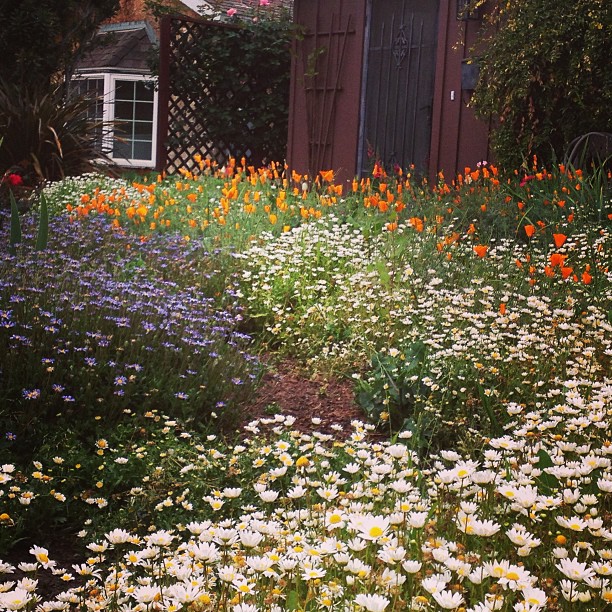As soon as spring is in the air Mr. Krippendorf and I begin an antiphonal chorus, like two frogs in neighboring ponds: What have you in bloom, I ask, and he answers from Ohio that there are hellebores in the woods, and crocuses and snowdrops and winter aconite. Then I tell him that in North Carolina the early daffodils are out but that the aconites are gone and the crocuses past their best..”
—Elizabeth Lawrence, The Little Bulbs
The photo is not of my garden; this lovely sight of a neighbor’s front yard left me breathless last April. I haven’t been down that street lately to see what may be in bloom, but the daisies and poppies are coming up in other yards around town. My own poppies are all leaf, not quite ready to set buds yet. But soon. And some of these small daisies have popped up quite unexpectedly in a large planter by my front steps, along with some adorable johnny-jumpups. Either they jumped up indeed, right into the pot, or it’s possible Rilla planted some seeds…she’s always finding an old half-full packet in a drawer somewhere (why do I only ever plant half the seeds in a packet?) and taking it upon herself to do a bit of Mary Lennoxing. Today it was freesia seeds, inherited from a friend, and some sweet peas and sweet william. I grow freesia from bulbs, not seed, so I’m eager to see if these come up. It’s turning wonderland out there, already…the lavender has gone supersized this year, the bees are quite drunk.
It’s the season when I have no choice, I must read gardening books. The Little Bulbs is mandatory at this time of year, when the freesia are tumbling everywhere. I could live on the scent of freesia. This bit to Miss Lawrence from her horticultural pen-pal, Mr. Krippendorf, one February day, made me laugh:
“I was surprised to hear of the paucity of bloom in your garden, as I once read a book by an Elizabeth Lawrence who listed quantities of plants that bloomed in February or even January in her garden (which she alleged was in Raleigh, North Carolina). We have quite a few snowdrops now, and some eranthis, in spite of the fact that the pool on the terrace freezes every night.” And later: “I have your letter dated Fourth Sunday in Lent but not mailed until Tuesday. You say you might as well have lived in Ohio this winter—that sounds almost scornful. Yesterday was a wonderful day, not too warm, and sunshine off and on. I have tens of thousands of winter aconites in the woods—bold groups repeating themselves into the distance, also the spring snowflakes, and Adonis amurensis.”
All this sudden color is the result of the few days of rain we had the other week, after a crispy, crackling, waterless winter. And I know so many of you in other parts of the U.S. have had a really dreadful time of it these past few months. I wouldn’t dare to ask Miss Lawrence’s question, above, but I’m starting to see hints on Facebook and Twitter of a crocus here, a narcissus there, and Mr. Krippendorf’s tens of thousands of winter aconites gave me courage.
***
Read today:
Henry Hikes to Fitchburg (ahhh, deep delight)
Grace for President
Here Comes Destructosaurus (coming out soon, quite funny, wonderful Jeremy Tankard art)
Finished Where Angels Fear to Tread. Forster is tearing me up, lately. I had to read Howards End because of the Susan Hill book, and it wrung me inside out, and Angels hung me out to dry. In a good way, you understand.
Add a Comment




Personally, I like Example 1. I know exactly where we are. It's unbearably hot in Texas and no one can think of anything else. Example 2 is a little confusing. I'm not as interested in what this character is doing with the wires.
In terms of beauty, example number 1 is uncontested. But I do think that it's important to note that both examples would be necessary for a complete novel: the first one develops a scene, describes a reality while the second has movement and relates action. Example 2 may not paint a detailed picture, but I know what's happening and it's getting somewhere. When authors start getting too dense with description and reflection, it gets boring-- especailly for a young adult audience.
I love beautiful language in novels and example #1 would reel me right in. There are writers out there who stick out in my mind as "poetic" (as trite as that sounds), and I always look forward to their books. I remember one book that blew me away because of the use of language...and that was The Book Thief, by Marcus Zusak. A stunning novel that celebrates words.
Example 1 for me. It creates in me that relaxed feeling of oh, I can let go, this writer knows what she/he is doing.
I personally enjoyed reading Example 1 more than 2. It was a much more descriptive writing and I could actually feel the burning heat of Texas as my eyes scrolled down the screen. In other words, it sort of transported me to the setting and changed the surroundings in my mind. However, I do agree with Joe that actions portrayed in Example 2 is needed in a writing. To me, the perfect reading material will be one that has both of them; that paints a perfect picture and situation for me, but also has a moving action that drives the story along.